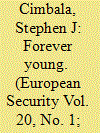| Srl | Item |
| 1 |
ID:
103202


|
|
|
|
|
| Publication |
2011.
|
| Summary/Abstract |
The New Strategic arms reduction treaty nuclear arms control agreement signed by US President, Barack Obama, and Russian President, Dmitry Medvedev, in 2010 is likely to achieve ratification in both Washington and Moscow, but it is too early to break out the champagne or vodka. Even successful ratification of this agreement is, at best, an important but incremental part of the US-Russian policy 'reset' and the larger agenda for both states with respect to arms reduction and nonproliferation. Further reductions in both states' inventories of strategic nuclear weapons are a necessary preface toward credible leadership in stopping the spread of nuclear arms - especially in the looming test cases of Iran and North Korea. In addition, both states have to decipher a policy-strategy nexus for emerging missile defense technologies: in particular, whether missile defenses should be seen as possible means of cooperative security, as between NATO and Russia, or whether they are firewalls in the way of further progress in offensive nuclear arms reductions.
|
|
|
|
|
|
|
|
|
|
|
|
|
|
|
|
| 2 |
ID:
103200


|
|
|
|
|
| Publication |
2011.
|
| Summary/Abstract |
This article discusses Russian perceptions of and attitudes toward the North Atlantic Treaty Organization (NATO). Russia has historically disliked and mistrusted NATO, seeing it as the primary threat to its international aspirations; in practice Russia pursues a dual policy. Its harsh condemnation of NATO has not stopped it from cooperating in selected areas of mutual interest. The most important among them is support for NATO's military operations in Afghanistan. The recent rejuvenation of relations between the west and Moscow is known as the strategic 'reset', meaning a return to diplomatic contacts and limited cooperation regardless of disagreements over the invasion of Georgia and Moscow's other recent international transgressions. The reset in NATO-Russia relations has only tactical significance, however. Cooperation will take place on a limited basis, but a genuine reset in mutual relations must wait for a reset in Russia's political and strategic priorities.
|
|
|
|
|
|
|
|
|
|
|
|
|
|
|
|
| 3 |
ID:
119109


|
|
|
|
|
| Publication |
2013.
|
| Summary/Abstract |
Russian history is replete with zig-zags between reform and reaction, ottepel' (thaw) and moroz (freezing), turns to and from the East and West. The year 2012 marked another zig-zag as Putin returned to the presidency, replacing Medvedev. Medvedev's presidency saw a "thaw" in Russian politics and improved relations with the West. Putin's return has largely frozen the thaw and stalled the reset; he has refocused Russian foreign policy to the Asia-Pacific.
|
|
|
|
|
|
|
|
|
|
|
|
|
|
|
|